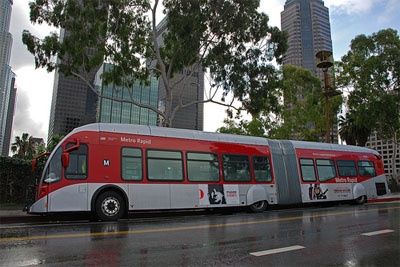On April 29, U.S. Transportation Secretary Mary Peters named Chicago as the recipient of a $153 million federal grant to implement congestion relief in Chicago by adding 10 miles of new, improved, and passenger-friendly bus service to city streets.
On April 29, U.S. Transportation
Secretary Mary Peters named
Chicago
as the recipient of a $153 million federal grant to
implement congestion relief in
Chicago
by adding 10 miles of new, improved,
and passenger-friendly bus service to city streets.
The new bus rapid transit (BRT) system
will be implemented concurrently with a new parking policy designed to encourage
people to take public transit.
The city’s plan to create a BRT
network brings
Chicago
’s public transit system into the
21
st
Century.
With
sleek, energy-efficient buses in designated lanes, the Chicago Transit Authority
(CTA) will be able to transport passengers quickly to their destinations using
improved services and advanced technology. The city has not announced specific
route locations, but will ultimately add more than 100 miles of bus-only lanes
along the city’s major corridors, to provide quick and easy access for commuters
leaving their cars at home.
Money
from the federal grant will pay for new hybrid buses, a kiosk system to allow
passengers to pre-pay their fares for quicker boarding, and the implementation
of stoplight technology that allows buses to acquire a priority green
light.

To increase transit usage and reduce congestion on city streets, central
business district parking fees will be increased during rush hour, and a
truck-loading zone system will be established to reduce redundant truck trips.
While BRT and parking pricing are not new ideas, Chicago will be the first major
city in the U.S. to implement such a comprehensive program on a city-wide scale.
These proactive measures to alleviate traffic will help save our region billions
in congestion- related costs, reduce our dependency on oil, and improve the
overall quality of our environment.
With gasoline topping $4 a gallon,
providing people with fast, efficient alternatives to being stuck in car traffic
is essential.
Cities like
Los Angeles
and
Vancouver
have successfully implemented BRT
corridors and are already realizing numerous benefits.
If the Chicago City Council and CTA
Board approve this measure,
Chicago
will be on the right track to breathing
easier, living healthier, and keeping the region moving.